A Walk in the Metropolitan Museum of Art with Min Jin Lee
"Choose the important over the urgent."
“I sold a book to Tina Turner in this very spot.”
Min Jin Lee and I are standing in the gift shop at The Met. Things have changed since Min Jin worked here—the area where her register once was is now a wide open space near some display tables. My jacket is dripping wet from the storm that rages outside, and I do my best to wipe away a few droplets that have fallen to the floor with my boot. The gift shop is, like everything in the museum, immaculate. I get nervous around nice things.
The original plan was for Min Jin and I to meet on the steps of The Met, then meander our way around Manhattan, stopping at the New York Public Library before heading to Korea Town for some food. But then a storm moved in. Quickly. Heavy rain and strong winds—then it started hailing. I was standing in front of the museum, my umbrella blown inside out, when I received the text from Min Jin: “Come to the members entrance.” Despite the weather, the line to get into The Met was long, which made me happy to see regardless of the chill in my bones. Even with apocalyptic weather, New Yorkers and tourists were still queuing up around the block to go see some art.
Min Jin waves at me and then flashes her members pass as we slip in a side entrance of the building. I apologize for being the cause of why she’s out in such terrible weather. “Well, you can never say I cancelled on you,” she says with a smile. Instead of the planned route, we decide to simply stroll around inside the museum. Taking in all the art, vases, rugs, and statues as we walk from room to room, whispering to one another so as not to disturb the numerous other guests.
Isaac: You sold a book to Tina Turner standing in this very spot? What was it like working at the museum?
Min Jin Lee: I was hired to work at The Met’s bookstore in 1986, the summer between high school and my freshman year of college. They hired me as a cashier, and I remember having to take an arithmetic test to qualify for the job. Luckily, I passed. It was such a joyful job. I loved it, because everybody I worked with really came from a place of caring about art. They didn’t simply want to have a job, they wanted to have a job at The Met.
I felt extra special, being 17 years old, because I was the youngest person working there. Everybody else was in their 30s or 40s. Mostly visual artists, a few actors. Talented people who needed a gig while they tried to make it in New York City. But they wanted to work in a beautiful environment. So working at The Met was a kind of coveted job. You’re in this beautiful space, surrounded by this beautiful art—you got free tickets to special exhibits—it was simply lovely.
Some of my favorite days were when we would pool our money together—my coworkers and I—and we would go and buy a really expensive roast chicken at Lobel's Prime Meats. It's a little jewel of a butcher shop on Madison Avenue, near the art galleries. It’s wildly expensive—where you’d go if you wanted Wagyu beef. But they also had these delicious roast chickens. They were $12 or so, which seemed like a gazillion dollars to me at the time. But two or three of us would all go in and buy one. Then we would sit on the steps of the museum and pick at this little roasted bird together. Grease dribbling down our faces. Happy as could be. So when I think of the Met, I always think of creative people hustling to get by. People who needed to pay the rent. But also it reminds me of enjoying the very finest things in life . These small moments filled with delicious meat, or being surrounded by priceless works of art.
But the best day was the day I sold a book to Tina Turner. I was stationed at the very, very back register. Business was slow and I was feeling a bit bored. All of a sudden this tiny, beautiful, elegant woman walks over to me—I'm 5' 8”, so I notice when people are smaller than me—and in that moment I realize that it’s Tina Turner. She hands me this expensive coffee table book—I’m pretty sure it was a photography book—and it cost something like a hundred dollars, which blew my mind. I didn’t know people would spend that much money on a single book back then. But I diligently rung her up, which is when she gave me her American Express Gold card. I checked the name and it read, “Tina Turner, Tiny Dancer Inc.”
It was my last day on the job. The evening before I left for college. She walked away and I remember thinking, “Out of all the registers, she chose mine.” I spent the rest of the afternoon walking around the museum and thinking, “How cool am I? Tina Turner chose me. I am the shit.” It is such a joyful, fun memory for me.
I: I call those types of stories, “Only in New York” stories. I mean, even without Tina Turner, working at The Met is quite literally an “Only in New York” story. What do you love about New York City?
MJL: I love this city’s hardiness. Even the decision to meet you for a walk today during a hail storm—that comes from a kind of New York hardiness. New Yorkers are like, “We're not going to let snow stop us. Fuck it.”
So it’s the toughness that I love, but it’s also the vulnerability. The connection. Because we all have this connection with one another—through the toughness. We believe, “I have to be tough because New York is such a tough place.” But at the same time, we have to be kind to one another, or we aren’t going to make it. You can’t function by yourself in New York. You think you can, but you really, really can’t. Simply because we live in such close proximity to each other. You have to rely on other people, whether you like it or not.
So sometimes you choose toughness, but other times you say, “I’m sorry.” Even if it’s simply to keep the peace. I'm always amazed there isn’t a war on the subway every single day. All of us packed in on top of one another, often seeing one another during some of our roughest moments. But we all know what it means to be down on our luck. We have this way of witnessing one another. That’s a connection, and it’s one of the reasons why I think there's so much volunteerism in New York City—and community activism—because we all feel very, “Oh, okay. We have to fix this. Because we’re all in this together.”
I: We have to be there for one another because all of us make up this city.
MJL: When you hear about a coat drive, you know that it's important to have a coat drive, because you know there are other New Yorkers who don’t have coats. And you’ve known somebody that doesn't have a coat. Or you yourself know what it’s like not to have a coat. I used to get hand-me-downs as a kid from my cousin, so I know exactly what it's like to rely on the generosity of another person. So now, “Okay. I have an extra coat. Time to make sure it’s put to good use.” If I don't wear it anymore, it's donated.
I: It's going back into the city.
MJL: Back to my neighbors.
I: None of this surprises me, because I have always thought of you as a very kind person. What it is about kindness that's important to you?
MJL: Very often people think kindness and niceness are a form of weakness or fear. That is so not true for me. I really love when people are nice. When people are nice—I think about units of kindness. If there were units of kindness, and you gave me one unit of kindness, I would love to give you 10 units of kindness in return. I love this idea of—let’s call it kindness math.
Because I think kindness is very intentional. It requires a great forbearance. You have to forbear your personal needs. You have to forbear your ego. That takes a lot of inner fortitude, and people don't realize the amount of inner fortitude it requires to say, “You know what? You're king for the day. I’m going to put your needs first.”
I'm not interested in living in the type of world where the winner takes all. I know the people of that world. I know why that world exists. I know the profits and the gains that a person can experience moving through the world with that kind of attitude. But I also know that it's not a very fun world, and it's not the world in which you want your kids to live in, or your neighbors, or anybody, really. So I choose to avoid it.
Because I do find that the more you do it—the kinder you are—the easier it gets. I think generosity or kindness as a sort of muscle, and it's a muscle that is worth developing. There's a lot of upside. It's not all simply sacrifice. Many people think, “Oh, if you do that, you're giving in to something.” To which I respond, "Actually, there's a lot more you get too, and it's a lot easier.” For me being kind is an easier way to move through the world.
I: Recently you’ve been talking about Free Food for Millionaires and Pachinko as the first two parts of a trilogy. The trilogy is called The Koreans, correct?
MJL: Correct. After I finished Free Food for Millionaires, I realized that the next books I really wanted to work on would complete this image I had in my mind of Koreans in the world. So I had done Koreans in America—in the Northeast—and then I did Koreans in 20th century Japan—because I had to write about Japan to write about Koreans and colonialism. I thought to myself, “How do I write about colonialism? I know. I'll bring them there.” And that was Pachinko.
Now, with the third book, I’m asking myself, “What do Koreans—of any socioeconomic group, of any geography—care about more than anything in the entire world?” So I went around really listening to the Koreans from Germany, from Brazil, from Australia, Singapore, Taiwan. I mean, I've met Koreans everywhere now. And the thing that I kept hearing over and over again is their focus on education. I was like, “Okay, I'm going to write about education.” And the locus of that is a hagwon, which is a private tutoring center. So, I wanted to write about this couple. They're not married. They're just friends. They're actually two women who are friends, and the husband and one of the women own this hagwon center, and it becomes really powerful. It becomes a kind of boutique hagwon for really elite people. So, I'm writing about that right now. That’s American Hagwon. That’s book three.
I: It seems like you’re tying to answer very specific questions with every book. Here you’ve come to the conclusion that Koreans are very focussed on education, but what question about education are you trying to answer?
MJL: My surface question is, “What is the purpose of education?” But my real, metaphysical question is, “What is wisdom? How do you live a wise life?” I'm 53, and I was supposed to get cancer in my 20s or 30s—because I had a very serious illness—so I've thought about death a lot. If we had to go tomorrow, well, let me ask you. Did you live the life you really wanted to live?
I: In terms of if I died tomorrow? My answer to that question is yes. Not without some regrets, of course. But overall, yes. Which I feel is very lucky.
MJL: Well, I don't know if it's all luck. Because it's also a decision—or a series of decisions—that you made. I want my life to matter, and not just in the books that I write, but in how I show up for other people. That’s how I take stock of my life. And I want to understand that in the context of a philosophy.
They don't really ask people like me, “What's your philosophy?” If you think of, say, world leaders, do they really ask that many people like me, “What is your philosophy? What is your governing principle on wisdom?” No. Maybe nobody cares, but I'm going to assert mine into this little book that I’m writing.
I: Obviously, to the folks reading this interview, buy the book. Read American Hagwon when it comes out. But can I ask you that very question, Min Jin? What is your philosophy?
MJL: Focus on things that really matter. I often give this statement when people ask me, “Do you have any advice?” I always say, “Choose the important over the urgent.”
I: Whew. That’s really good. Also, I suck at that.
MJL: Well, I don't know if you suck at it, but it is a practice. Something you have to work on. For example, if someone said, “Oh, you have to get this concert ticket right now.” You'd be all, “Ahh!” You're immediately trying to get the concert ticket. That comes from anxiety, right? That’s where the practice comes in. You have to take a beat in that moment and ask yourself, “Is it possible to see this band again later on?” Or, even if it isn’t possible, is it okay to ignore the needs of your partner? Or your kids? Or your parents? Simply so you can get these concert tickets? You have to figure out what's really important—what truly matters—versus what simply feels urgent.
I'm always trying to ask myself, “What's really important, and what feels urgent?” Because right now we're being flooded with choices, and flooded with distractions. Another example, why did I say yes to going on this walk with you? I wanted to spend time with you. So I made that choice. Now we are here and I am focussed on you. You, Isaac, are really important. This moment is really important.
So you make choices and act deliberately. To recognize the importance of the moments in your life. I think it's kind of cool to think that your life matters. It's kind of cool to think that this moment matters, that it's not something to get through, but it's actually something to be in. I see that now as an older person. I like that.
I: Speaking of acting deliberately. There were ten years between the publication of Free Food for Millionaires and the publication of Pachinko. Was that a choice?What was important about that time?
MJL: If I could do it again, I wouldn't have taken so long. I wouldn't. It was horrible.
I: Really?
MJL: Of course it was. Failing and floundering is horrible. It's humiliating. Most of my career has been not getting what I wanted—not even getting close. When I think about how many things I'm included in now versus the first 20 years of my career, I think maybe that’s the reason I'm so grateful. I know how hard it is to get to be included in something, whereas before, I felt like I was in Antarctica or Siberia.
I: So there’s no aspect of, “Oh, I needed that time for the book to bake”? It truly was a struggle? Which I think is a beautiful answer.
MJL: I'm a Presbyterian. That means that I believe in something completely difficult for most people to believe. I believe that there is a plan—and that somehow, I am part of this plan—while also believing in free will. This is a very, very strange concept. So, yes, to answer your question, there must have been a reason why I had to suffer and wait ten fucking years for Pachinko. As a terrible Presbyterian, I have to say, I'm really mad about it. If I ever meet God, I'll be like, “Why?”
I: “What the heck, man?”
MJL: I might get smote, but the God that I believe in is a God that you can engage and joke around with. So yeah, “What the heck, man. Come on. I'm so nice.”
I: Not to keep going with this bit, but do you think God’s answer might be, “I hear you, but look what happened with Pachinko.”
MJL: Yeah, yeah, yeah. But I still think my answer would be, “But couldn't I have done it in my 30s, when I was cuter?”
But no, I didn't like waiting. It was horrible. I have no zen in me. I have no, “Yes. It was meant to be.” My feeling in general was, “I'm pissed.”
I: You were a lawyer before you were a writer. When did you decide to say “fuck it”?
MJL: 1995. I started being a lawyer in 1993 when I graduated law school. And then I quit in 1995. I think it was July. I didn't plan on quitting, but I finished this really tough assignment and I gave it to the managing partner and they immediately gave me another assignment. Without even thinking I said, “I can't do this anymore.” The words simply came out of my body. It was the equivalent to somebody screaming when they're in pain. I simple said the words, “I can't do this anymore.” And then I went home.
I didn’t have a plan. So I decided, “Okay, I’m going to write a book. I'm going to sell it and I'm going to make $83,000 a year,” because that's what I made as a lawyer. Of course now I know how ridiculous that sounds. I wouldn’t publish my first book for another twelve years.
I: Were you writing the whole time?
MJL: Yes. The first book I wrote was called Revival of the Senses. You've never heard of it because it's not published. It was so boring. Really competent prose, but so, so boring. Even my husband said, “It's really boring,” and he’s one of the nicest people on the planet. Then I wrote Motherland—which was a precursor to Pachinko—and that was garbage. Then I got really depressed and at the same time I got really sick with my liver disease. Then I wrote Free Food for Millionaires. So Free Food for Millionaires is my third novel to manuscript, my first to publish—twelve years later in 2007.
Which was very hard, because when I quit being a lawyer, I thought, “Okay, I'm going to call myself a writer.” Then, the world says, “No. You're not a writer unless you have a published book.” But that whole time I was writing, and I was getting better, and I was getting stronger, but I couldn't prove it. I ate a lot of humble pie. I'd go to places, and people would say, “You call yourself a writer? Where's your book? ” It took a lot of courage for me to even say I was a writer, but I had to inhabit that identity in my mind in order to accomplish my goals.
It was good lesson. Every single writer that you can name—all the greats—they were a writer before they published their first book. And that’s what I wanted. I wanted to be a great writer. That was my vanity. But every writer is a writer before they publish their first book.
I: And here you are. A great writer.
MJL: I don’t know. The only person who has the right to say that is the reader.
I: You mentioned a liver disease?
MJL: I had a liver disease for over two decades. I gave blood when I was 16—my friend had a blood drive—and after I gave the Red Cross sent me a letter that said, “Please don't ever give blood again because you are a chronic Hepatitis B carrier.” That’s when I learned that I had a liver disease. It was communicable through sex, through childbirth, and also through blood. I was asymptomatic, but then in college I got really, really sick. That’s when my doctor told me I'd get cancer in my 20s or my 30s. What I did get in my 30s was liver cirrhosis. I had Interferon-β as a treatment and that's when I got better. Before that I was extremely sick.
I: Do you think your closeness with death from an early age is linked to your want to make something long and lasting in this world?
MJL: Oh, absolutely. I lost Korea when I was seven—that’s when my family moved here—so I feel like my childhood ended at age seven. My parents were really stressed when they came here. Even more stressed than they were in Korea. They were working a lot and it was a very dangerous job. My parents experienced a lot of crime. I was with my father when he was mugged. It was so, so dangerous. So yes, even before the liver disease—from a very early age—I knew how precarious life is.
I: What are your memories of moving from Seoul to New York City?
MJL: When I was on the plane coming here—like I said, I was seven—I had recently read a lot of stories like “Cinderella.” So I had it in my head that New York City would look like 17th century Europe. I thought that everyone would have big, Marie Antoinette hair and that the women would be wasp-waisted with big ball gowns. Instead of cars I thought there would be stage coaches, the kind a fairy godmother might magically make for you out of a pumpkin.
Then I got off the plane at JFK, and everybody simply looked like they were Western versions of the Koreans in Seoul. I remember feeling so disappointed, because I really thought there would be people in waistcoats, and footman and butlers. I thought it'd be so beautiful, like all the storybooks that I’d read. But instead I remember thinking, “Oh. Just another dirty city, exactly like the one we’d just come from. Damn it.”
I: What got you through last year?
MJL: I never left the city. Did you leave?
I: No.
MJL: Same. So I was here the whole time, and what I remember most is the beginning. Remember the sirens?
I: Yes.
MJL: I remember thinking that I simply had to keep it together. I had to keep my wits about me. I remember every day this feeling of, “I have to take care of my family. I have to take care of my friends. I have to take care of my parents.” Which I did, because my parents needed groceries but they couldn’t go to the store. So I had this real instinct of, “I have to survive.” I wasn't thinking about anything metaphysical. It was simply, “I have to survive.”
I still feel that way. Whenever crisis hits, my first thought is, “Okay, what do we do?” But also, making sure to make room for joy. Here we are, in the museum, filled with vaccinated people. This winter will still be hard, but maybe a little less lonely than last winter. I have a lot of love in my life. So I’m grateful. I know what it's like to stare down at death. I've had liver stress, I've been on Interferon-β, I've lost my hair. I've done all that. This is the gift, right? Here we are.
I: Why do you care about art?
MJL: I think art is important to me because I am troubled by the chaos of life. For me, among other things, art is comprised of: order, unity, meaning, memory, feeling, and invention. Hence, my job as an artist is to create my cosmos from that chaos. I value art because it is a product of an artist’s struggle, and one way of making sense out of what sometimes feels like nonsense.
I: Other than it being the place you sold a photography book to Tina Turner, what do you love about The Met?
MJL: The sense of monumental proportions, and history and beauty. It’s the same thing I love about the New York Public Library. These grandiose, gorgeous places that are open to the public. They belong to us. How cool is that?
I: I feel that way about so many parts of New York City. The parks, the museums, the gardens and the city pools.
MJL: I think there are so few places in the city that are this beautiful—this vast—in which any person can sit and have it feel as if she has it all to herself. This space, this quiet, here in the middle of New York City? It’s the ultimate luxury.
By now we are sitting by a reflecting pool and looking at The Temple of Dendur. Our walk has taken us all over the museum (including a stop at The Eatery on the ground floor, where I enjoyed a sandwich and some wine while Min Jin ate a salad and insisted on paying). The room we are in now—Min Jin’s favorite—is open and spacious, and through the large glass windows we can see that the storm outside has subsided. Without any prompt we sit there for a moment, together, in silence—before we go our separate ways—choosing the important over the urgent.




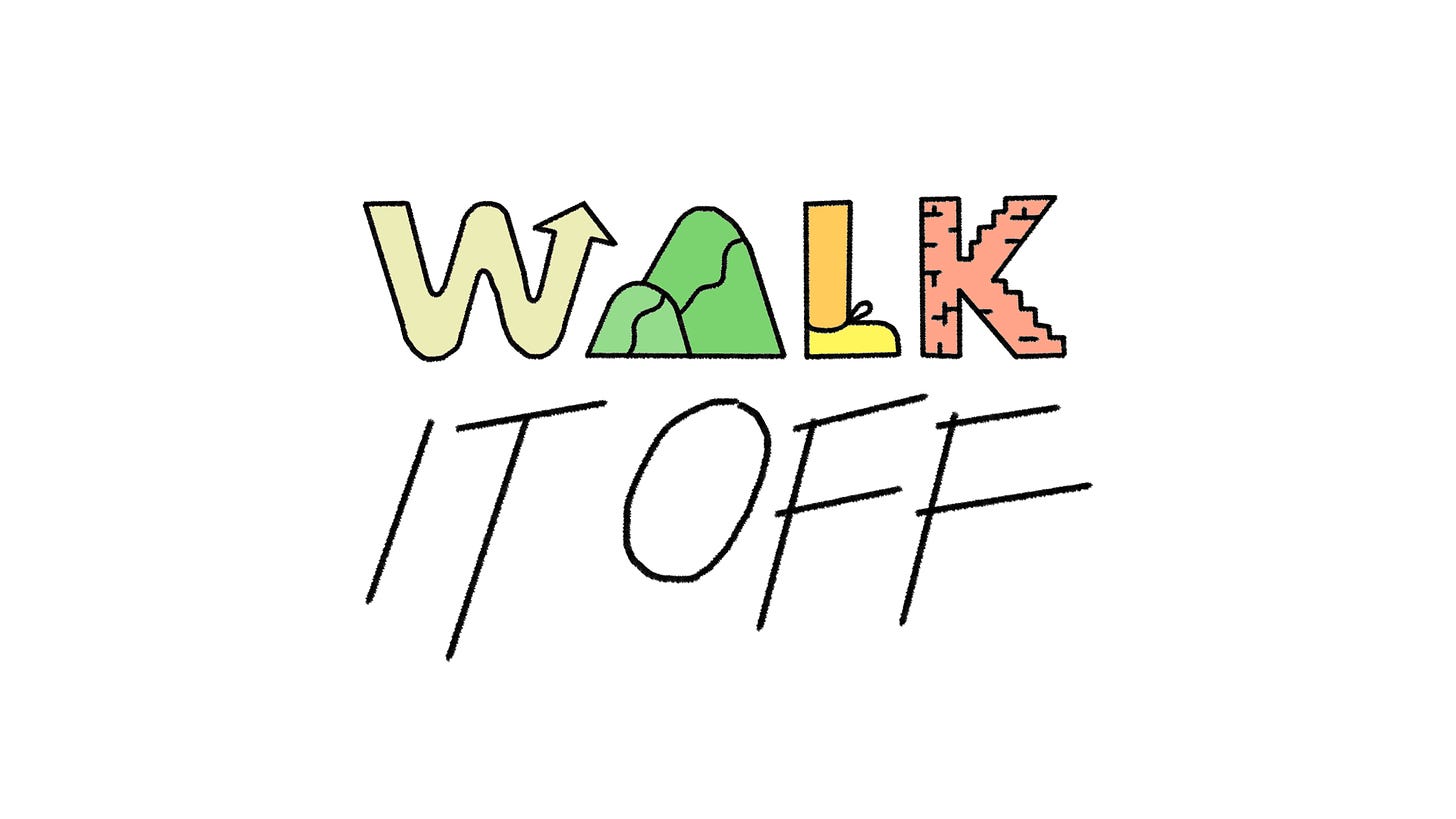

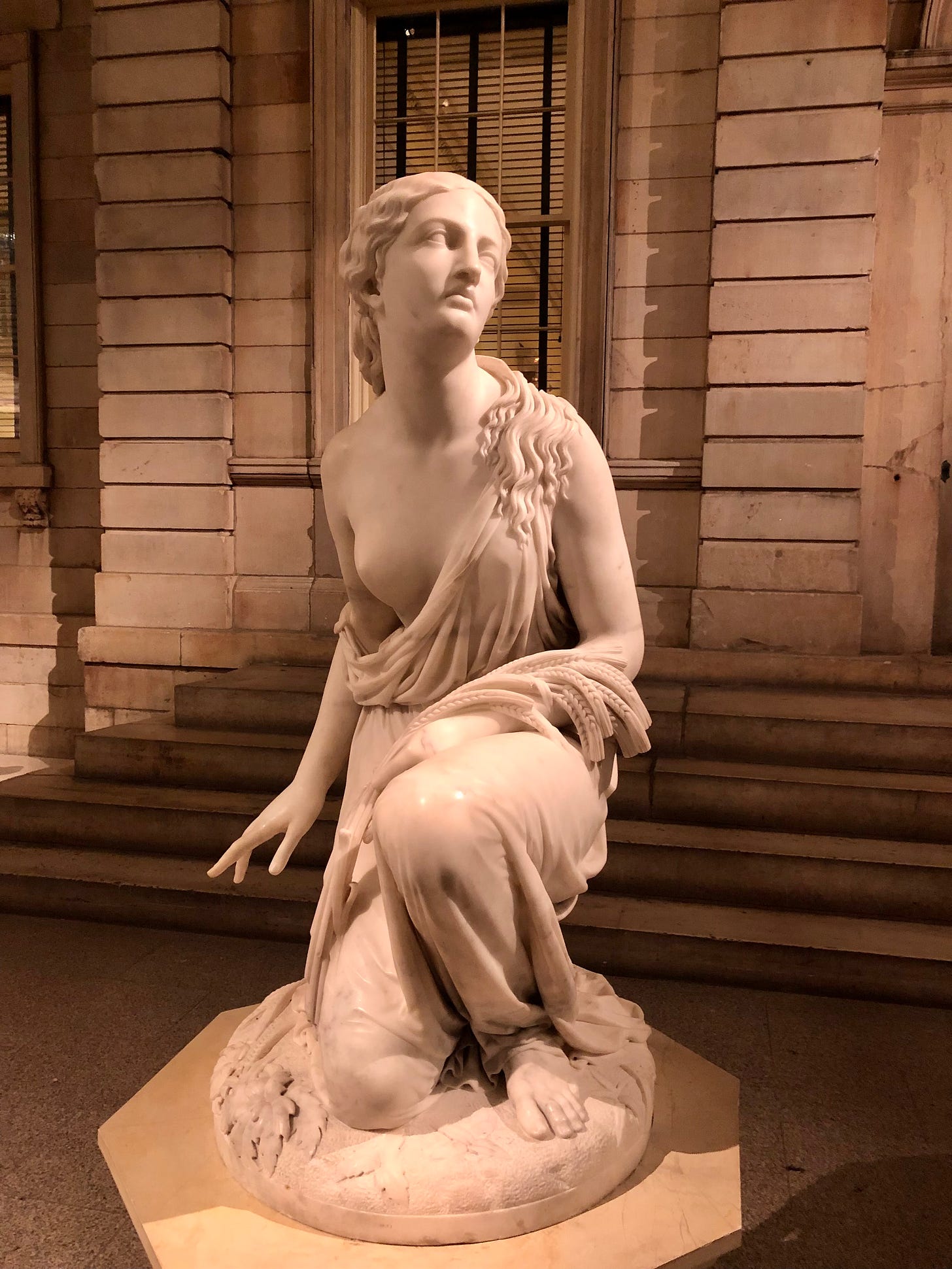
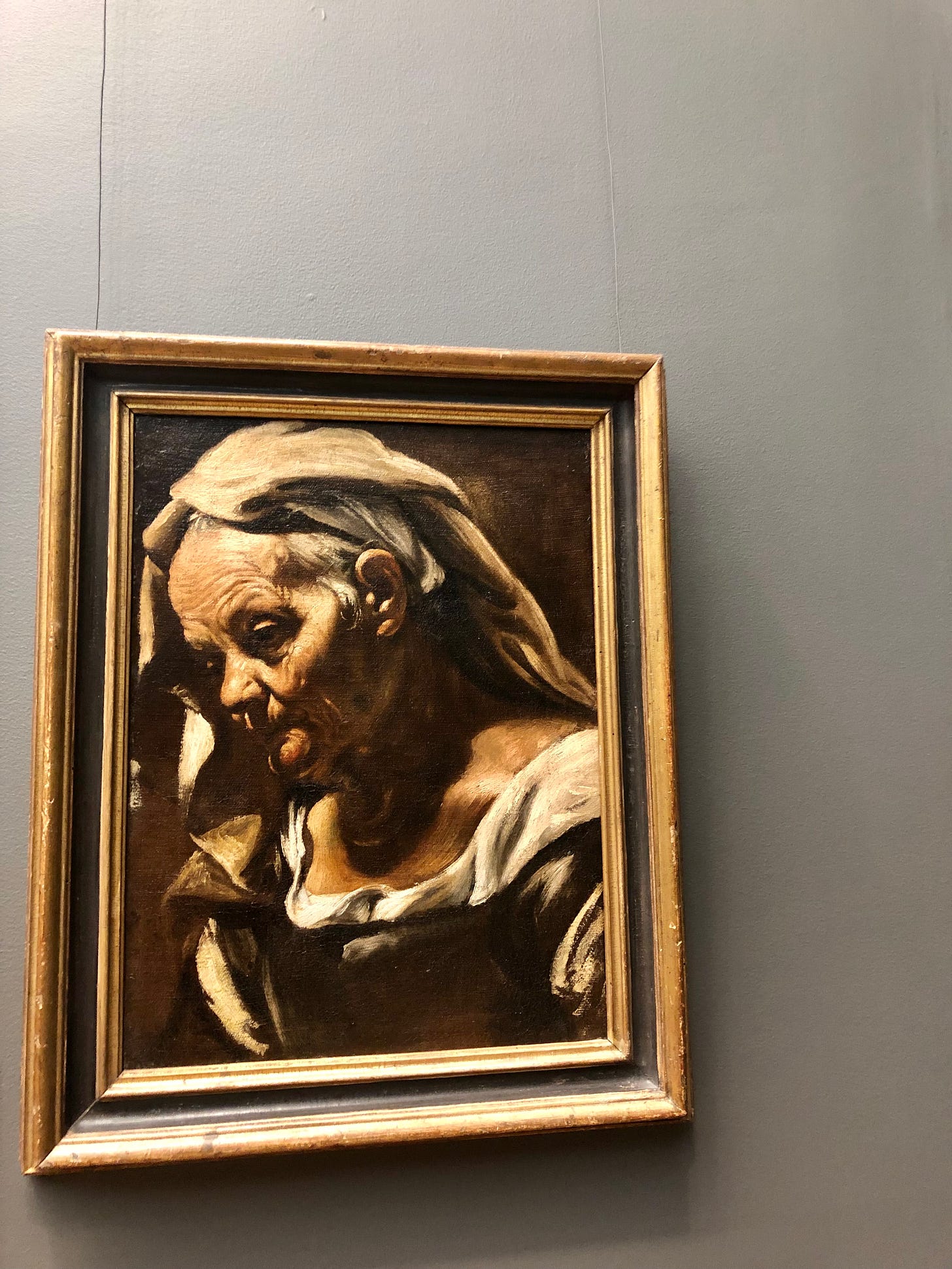

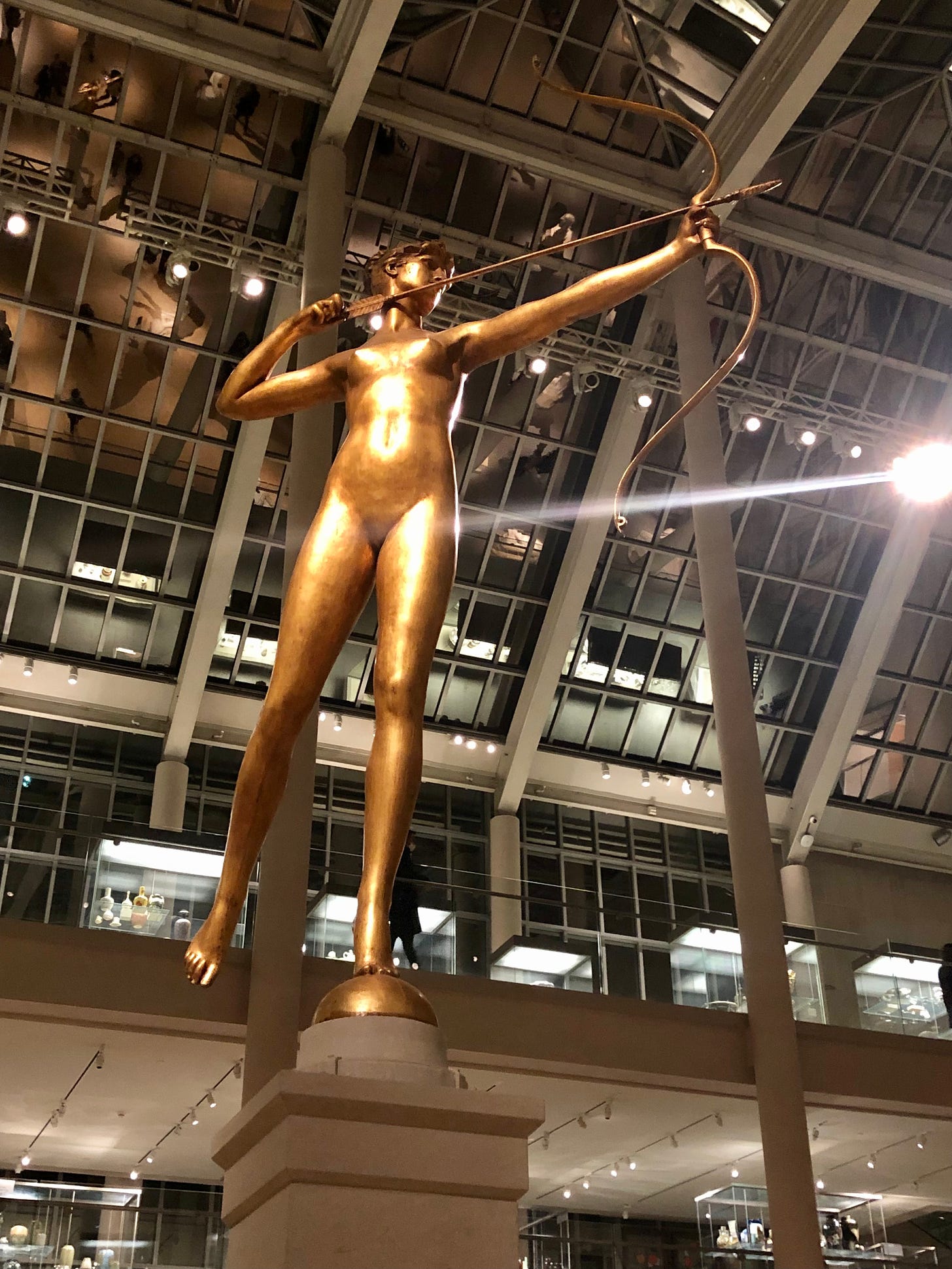



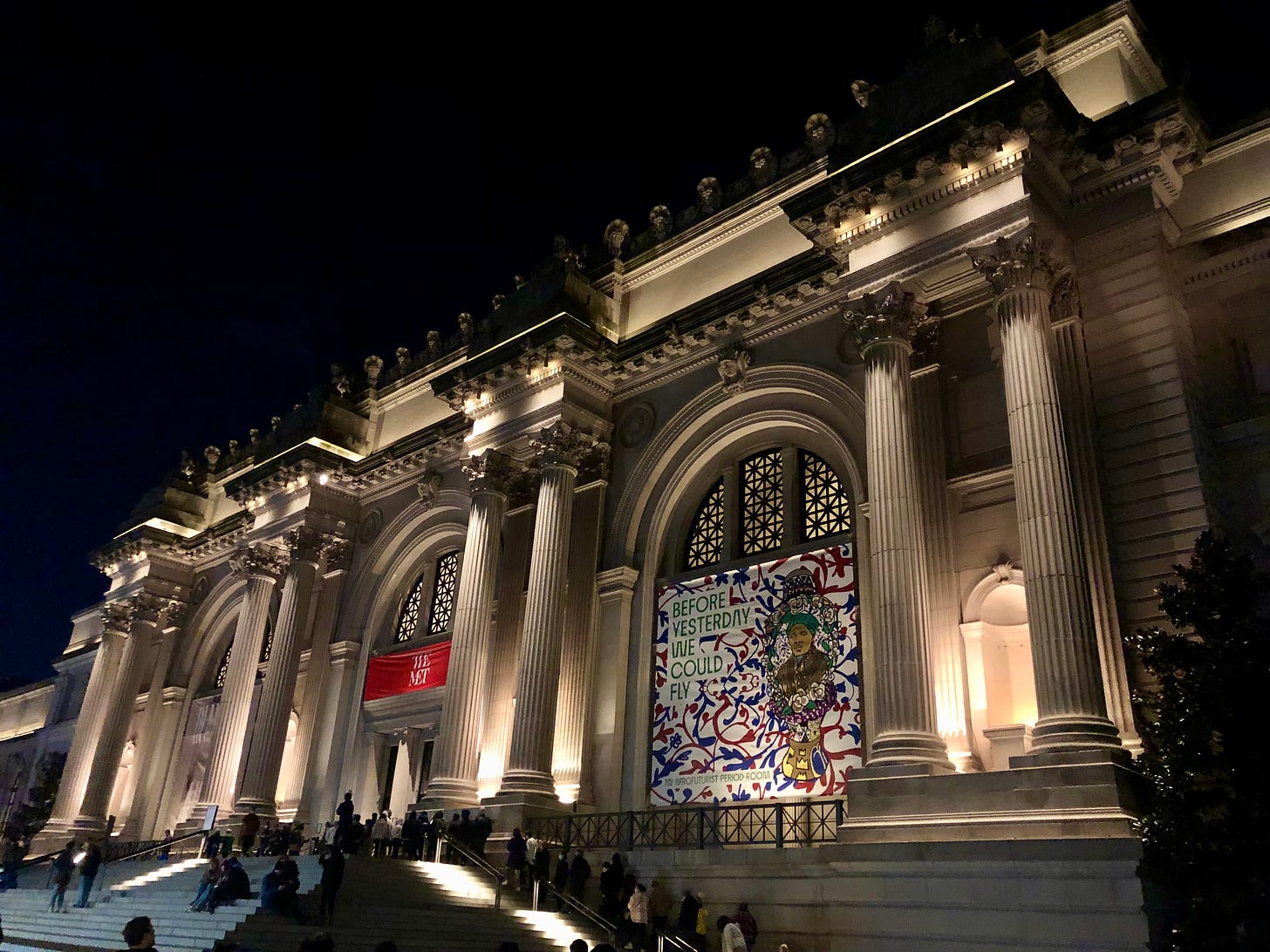
Lovely! Just lovely. Thank you Isaac for writing about another, sort of “love connection” that you make on your walks!
I love the concept of kindness math. Also the thought that kindness or generosity is a sort of muscle to develop...